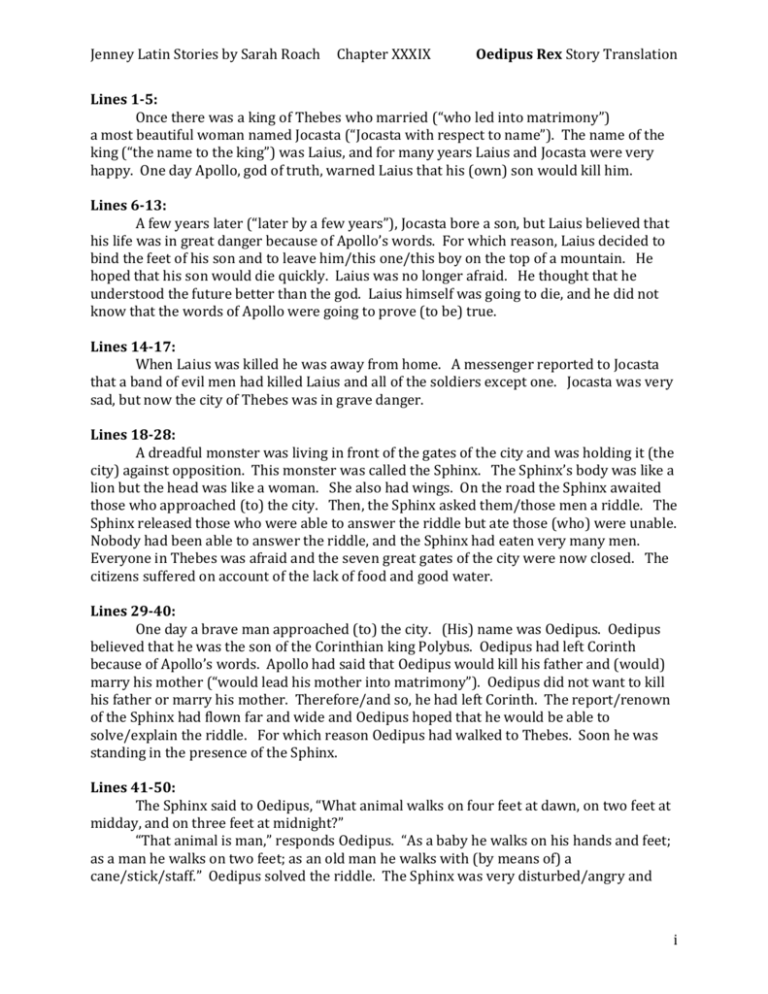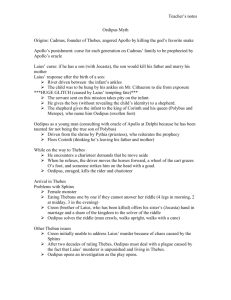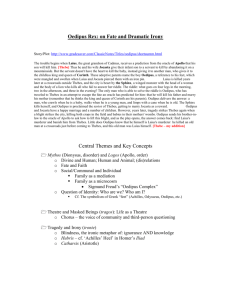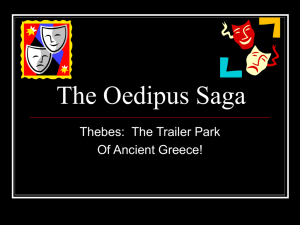Jenney Latin Stories by Sarah RoachChapter XXXIXOedipus Rex
advertisement

Jenney Latin Stories by Sarah Roach Chapter XXXIX Oedipus Rex Story Translation Lines 1-5: Once there was a king of Thebes who married (“who led into matrimony”) a most beautiful woman named Jocasta (“Jocasta with respect to name”). The name of the king (“the name to the king”) was Laius, and for many years Laius and Jocasta were very happy. One day Apollo, god of truth, warned Laius that his (own) son would kill him. Lines 6-13: A few years later (“later by a few years”), Jocasta bore a son, but Laius believed that his life was in great danger because of Apollo’s words. For which reason, Laius decided to bind the feet of his son and to leave him/this one/this boy on the top of a mountain. He hoped that his son would die quickly. Laius was no longer afraid. He thought that he understood the future better than the god. Laius himself was going to die, and he did not know that the words of Apollo were going to prove (to be) true. Lines 14-17: When Laius was killed he was away from home. A messenger reported to Jocasta that a band of evil men had killed Laius and all of the soldiers except one. Jocasta was very sad, but now the city of Thebes was in grave danger. Lines 18-28: A dreadful monster was living in front of the gates of the city and was holding it (the city) against opposition. This monster was called the Sphinx. The Sphinx’s body was like a lion but the head was like a woman. She also had wings. On the road the Sphinx awaited those who approached (to) the city. Then, the Sphinx asked them/those men a riddle. The Sphinx released those who were able to answer the riddle but ate those (who) were unable. Nobody had been able to answer the riddle, and the Sphinx had eaten very many men. Everyone in Thebes was afraid and the seven great gates of the city were now closed. The citizens suffered on account of the lack of food and good water. Lines 29-40: One day a brave man approached (to) the city. (His) name was Oedipus. Oedipus believed that he was the son of the Corinthian king Polybus. Oedipus had left Corinth because of Apollo’s words. Apollo had said that Oedipus would kill his father and (would) marry his mother (“would lead his mother into matrimony”). Oedipus did not want to kill his father or marry his mother. Therefore/and so, he had left Corinth. The report/renown of the Sphinx had flown far and wide and Oedipus hoped that he would be able to solve/explain the riddle. For which reason Oedipus had walked to Thebes. Soon he was standing in the presence of the Sphinx. Lines 41-50: The Sphinx said to Oedipus, “What animal walks on four feet at dawn, on two feet at midday, and on three feet at midnight?” “That animal is man,” responds Oedipus. “As a baby he walks on his hands and feet; as a man he walks on two feet; as an old man he walks with (by means of) a cane/stick/staff.” Oedipus solved the riddle. The Sphinx was very disturbed/angry and i Jenney Latin Stories by Sarah Roach Chapter XXXIX Oedipus Rex Story Translation killed herself. Oedipus had saved Thebes. The grateful people made him king, and he married queen Jocasta (“he led queen Jocasta into matrimony”). Lines 51-64: A few years later (“later by a few years”), Jocasta gave birth to two sons. Oedipus and Jocasta were very happy, but soon Thebes was again in serious peril. Everything in the kingdom was dying. Men, women, children, and animals were suffering due to a lack of grain and water. Oedipus wanted to find out the cause of the danger and sent Jocasta’s brother to the temple of Apollo. Apollo spoke the truth: as soon as Oedipus knows/learned the name of that man who killed Laius, the danger will leave Thebes. Jocasta’s brother returned (“took himself back”) to Thebes and told Oedipus what (“which things”) Apollo had said. Immediately Oedipus wanted to find out the name of the man and sought help from Tiresias, an old man who was always able to predict the future. Lines 65-80: Tiresias did not want to tell Oediups the man’s name but at last said, “You yourself are that man whom you seek.” Neither Oedipus nor Jocasta believed him/this man. Jocasta says, “The words of Tiresias are not true, Laius was killed on the road by a band of evil men.” “When was Laius killed?” says Oedipus. “Laius was killed a few days before (“before by a few days”) you arrived at Thebes,” answers Jocasta. “Do you know,” says Oedipus, “how many men were with him?” Jocasta replies, “Five men were making the journey with Laius and all but one were killed.” “I want to see this man,” says Oedipus. “Send this man to me.” “I will send him/this man to you,” says Jocasta. “What (things) can (future)/will he be able to tell you?” Lines 81-91: “I will tell (you),” answers Oedipus. “I left Corinth because of (my) fear for the words of Apollo. Apollo said that I would kill my father and marry my mother. For which reason I decided not to return (“not to take myself back”) to Corinth. I learned about the riddle of the Sphinx and wanted to solve it and save Thebes. On my route to Thebes, five men approached me and tried to force me from the road. I fought with these men and one of the men wounded me with (his) stick. I thought that I had killed all the men. You don’t think Laius was their leader (“the leader of these (men)”), do you? ii Jenney Latin Stories by Sarah Roach Chapter XXXIX Oedipus Rex Story Translation Lines 92- 105 Jocasta says, “I do not think Laius was the men’s leader.” “This man who was not killed told me a story about a band of bad men. Apollo said that our son would kill Laius and for this reason we abandoned our son on the top of a mountain. Therefore, the words of Apollo are not true because our son has died/is dead.” That day, a messenger arrived at Thebes from Corinth and announced the death of Polybus. Jocasta says to Oedipus, “Again the words of Apollo are not true. You did not kill your father Polybus.” The messenger said to Oedipus, “You ran away from Corinth due to a fear of your father’s death by your hand? You are not the son of Polybus. I do not know the name of your father or mother. A slave gave you to me and I gave you to Polybus.” Lines 106-112: “Do you remember (“do you hold by means of memory”),” says Oedipus, “the slave who gave me to you?” The messenger responds, “I remember the slave. He was guarding the flocks/herds of Laius.” Oedipus ordered the slave to be found. Soon the slave was standing in the presence of Oedipus and the messenger. The slave and the messenger recognized each other (“amongst themselves”). Then nobody doubted that Oedipus was the son of Laius. Lines 113-122 When Oedipus understood that he had killed his father and married his mother, he ran into the palace. He looked for Jocasta, but when he found her, she was dead/she had died. She/this woman perceived that the words of Apollo were true and killed herself on account of the infamy of their crimes. Oedipus took up/seized the brooch which Jocasta always wore and wounded his (own) eyes. Because of the shame of his impious deeds, he never wanted to see the light of day. He thought that it was better to live his own life without eyes than always to see the world with pain. iii



